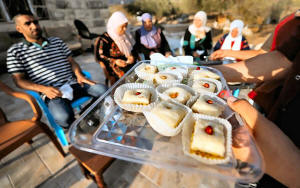|
Tlaib's grandmother, aunts and uncles welcomed neighbors in the
village of Beit Ur al-Fauqa in the Israeli-occupied West Bank,
who gathered near their single-story stone house beside a grove
of olive trees to congratulate them on the historic win.
"This makes us proud - as the Tlaib family, residents of Beit
Ur, as Palestinians, as Arabs and as Muslims, that a simple girl
reaches such a position," said her uncle, Bassam Tlaib.
Tlaib's family said the soon-to-be Congresswoman held her
wedding in Beit Ur al-Fauqa in 1997 and last visited the village
in 2006.
The oldest of 14 children born to a family of Palestinian
immigrants, Tlaib is a Detroit native. Her father worked at a
Ford Motor Company plant in the city, home of the U.S. car
industry, and she became the first Muslim woman elected to the
state legislature.
On Tuesday she won her district's Democratic nomination for
Michigan's 13th Congressional district, encompassing parts of
Detroit and surrounding suburbs and home to one of the largest
Muslim and Arab-American populations in the United States.
Since no one ran in the Republican primary, Tlaib is poised to
win the seat.
The West Bank is occupied by Israel which captured it in a 1967
Middle East war. The Western-backed Palestinian Authority has
limited self-rule in the territory which is home to around 3
million stateless Palestinians. Israel maintains a military
presence with checkpoints on major roads to protect 400,000
Jewish settlers.
(This version of the story has been refiled to fix spelling in
paragraph two to 'trees' not 'tress')
(Additional reporting by Sabreen Taha in Jerusalem and Barbara
Goldberg in New York; Editing by Peter Graff)
[© 2018 Thomson Reuters. All rights
reserved.] Copyright 2018 Reuters. All rights reserved. This material may not be published,
broadcast, rewritten or redistributed.
Thompson Reuters is solely responsible for this content.

|
|







